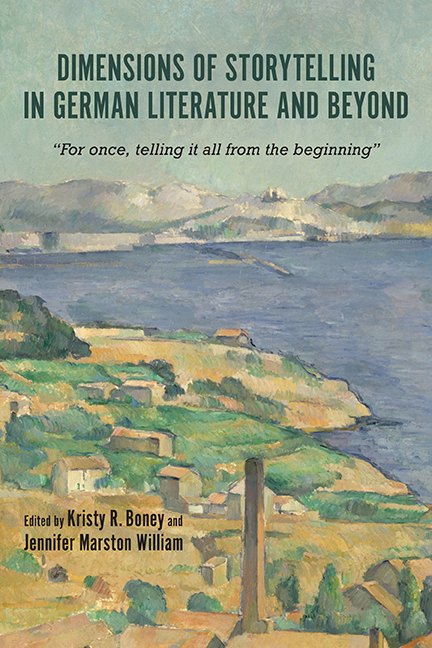 Dimensions of Storytelling in German Literature and Beyond
Dimensions of Storytelling in German Literature and Beyond Book contents
- Frontmatter
- Contents
- Acknowledgments
- Introduction: The Social, Political, and Personal Dimensions of Storytelling
- Part I Anna Seghers: A Missing Piece in the Canon of Modernist Storytellers
- Part II Expressions of Modernity: Using Storytelling Unconventionally
- Part III The Personal Narrative: Storytelling in Acute Historical Moments
- 14 Problems and Effects of Autobiographical Storytelling: Als Pimpf in Polen: Erweiterte Kinderlandverschickung 1940–1945 (1993) and A Hitler Youth in Poland: The Nazis’ Program for Evacuating Children during World War II (1998)
- 15 Too Near, Too Far: My GDR Story
- 16 Conflict without Resolution: Konrad Wolf and the Dilemma of Hatred
- 17 “Bleibt noch ein Lied zu singen”: Autobiographical and Cultural Memory in Christa Wolf's Novel Kindheitsmuster
- 18 Narrating germany's past: a story of exile and the return home—a translation of the chapter “above the lake” from ursula Krechel's Novel Landgericht
- 19 Storytelling in the GDR: An Interview with Eberhard Aurich and Christa Streiber-Aurich
- Notes on the Contributors
- Index
14 - Problems and Effects of Autobiographical Storytelling: Als Pimpf in Polen: Erweiterte Kinderlandverschickung 1940–1945 (1993) and A Hitler Youth in Poland: The Nazis’ Program for Evacuating Children during World War II (1998)
from Part III - The Personal Narrative: Storytelling in Acute Historical Moments
Published online by Cambridge University Press: 12 April 2019
- Frontmatter
- Contents
- Acknowledgments
- Introduction: The Social, Political, and Personal Dimensions of Storytelling
- Part I Anna Seghers: A Missing Piece in the Canon of Modernist Storytellers
- Part II Expressions of Modernity: Using Storytelling Unconventionally
- Part III The Personal Narrative: Storytelling in Acute Historical Moments
- 14 Problems and Effects of Autobiographical Storytelling: Als Pimpf in Polen: Erweiterte Kinderlandverschickung 1940–1945 (1993) and A Hitler Youth in Poland: The Nazis’ Program for Evacuating Children during World War II (1998)
- 15 Too Near, Too Far: My GDR Story
- 16 Conflict without Resolution: Konrad Wolf and the Dilemma of Hatred
- 17 “Bleibt noch ein Lied zu singen”: Autobiographical and Cultural Memory in Christa Wolf's Novel Kindheitsmuster
- 18 Narrating germany's past: a story of exile and the return home—a translation of the chapter “above the lake” from ursula Krechel's Novel Landgericht
- 19 Storytelling in the GDR: An Interview with Eberhard Aurich and Christa Streiber-Aurich
- Notes on the Contributors
- Index
Summary
STORYTELLING IS ONE OF THE OLDEST, if not the oldest, form of literary discourse. People always wanted to tell others about interesting historical events, legendary adventures, or their own life stories—no matter whether these were really true or only imaginary. In fiction this aspect of the purely interesting was from the outset accepted as “poetical.” In historical or autobiographical retelling of facts, on the other hand, everything was expected to be “true.” But what is truth? This is one of the oldest questions in this regard, as we know. Isn't every story, even those that pretend to expose only the bare facts, at the same time the product of specific individuals who arrange their stories according to their own convictions based on conscious or subconscious ideological aims, or on their supposed capability to remember the facts exactly? So many questions, so few answers, as the saying goes.
As a case in point, I would like to problematize my own autobiographical report, Als Pimpf in Polen, which I wrote in the early 1990s, describing my dreadful experiences in the Nazi program for evacuating children during the Second World War. Although German fascism had always been one of the central interests of my literary and political investigations, I had never written anything up to that point about my traumatic experiences of those years. My sudden interest in this phenomenon resulted mainly from the following occurrence. When I was in Berlin after German reunification in 1989, I heard from several schoolteachers there that some of their pupils in the eastern section of that city were joining neo-fascist organizations that attributed the rising unemployment of their parents to the evils of capitalism. Their exposure to these right-wing groups led them to see the new socioeconomic situation as a cold, competitive struggle for life where even the concepts of solidarity propagated during the forced socialism they had experienced under the Honecker regime were disappearing. Fed up with the restrictions of this system, they were suddenly told by their neofascist group leaders that during the Nazi period there had been a real national people's community (Volksgemeinschaft) based on solidarity and even camaraderie and friendship, and this was increasingly attractive to them.
- Type
- Chapter
- Information
- Dimensions of Storytelling in German Literature and Beyond“For once, telling it all from the beginning”, pp. 189 - 197Publisher: Boydell & BrewerPrint publication year: 2018
